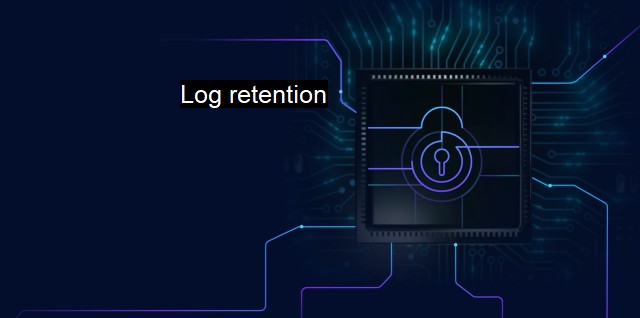What is Log retention?
The Crucial Role of Log Retention in Cybersecurity and Antivirus: Preserving Essential Data to Protect IT Systems and Detect Threats
Log retention, in the context of cybersecurity and antivirus solutions, refers to the process of retaining, managing, and storing system, application, or user activity logs over a specified period. These logs include a range of data type, such as network connections, file access, system changes, and user activities, anything that might contribute to an understanding of what has transpired in a specific IT environment.Log retention serves as a chronicle of events that helps system administrators and security experts to monitor and analyze system behavior for potential security incidents or breaches. Each log entry retains time-stamped details about a system's or application's operations, providing valuable snapshots of what occurred before, during, and after a security event.
In the context of antivirus solutions, log retention is crucial. Antivirus software routinely scans computer systems and generates logs with details about the scan, including information about any threats it detects and the actions the software has taken. These virus scan logs can help in undertaking subsequent steps to ensure the system's security. By analyzing and interpreting the data from these logs, system administrators can confirm the effectiveness of their antivirus solution and adjust configurations or policies as needed to optimize protection.
Log retention is necessary for multiple reasons. It supports troubleshooting and forensic investigation following a security incident and forms an irreplaceable part of incident response. Post-incident reviews rely heavily on log files to retrace a security incident's steps correctly. log retention supports compliance with a multitude of regulations like GDPR, HIPAA, or SOX, that mandate businesses maintain comprehensive records of system activities and user data interaction for periods ranging from months to years. Failure to adhere to such laws can result in hefty penalties for organizations.
The importance of a well-crafted log retention policy in maintaining an accurate history of system events and activities, thus, cannot be overstated. Such a policy governs how long different types of logs should be stored, where they should be stored, who should have access to them, and when they should be disposed of or archived. Striking a balance is crucial since retaining unneeded logs can unnecessarily consume storage space and lead to performance issues, while prematurely deleting logs can deprive organizations of vital insights or lead to noncompliance with regulations.
Organizations must invest in an advanced log management solution to securely and efficiently manage retention. Such measures can automate log data collection from a range of sources across the network, enable long-term log storage and retrieval, plus provide potent search and analysis functionalities. Several platforms also provide real-time log monitoring and alerting capabilities to bolster the organization's security posture and speed up threat detection and response.
The process is a part of a more extensive system of protocols called a Security Information and Event Management (SIEM) system, which collects, filters, and combines information to present a complete image of the network's security standing.
Log retention plays a significant role in cybersecurity. It's not only vital for after-the-fact analysis of security incidents but also helps to anticipate potential threats and highlight any unusual behavior, enhancing the total security posture of organizations. Proper screen and management of logs are significant for both the daily operation of systems and the compliance of organizations with data protection laws. Thus, investing in appropriate log management tools and establishing a robust log retention policy is indubitably essential for today's businesses.

Log retention FAQs
What is log retention?
Log retention refers to the practice of keeping a record of all system and network activity, such as login attempts, file access, and network traffic. This record is stored in log files and is an essential tool for detecting and investigating security incidents. It also helps in monitoring and auditing activity on the network.Why is log retention important in cybersecurity and antivirus?
Log retention is vital in cybersecurity and antivirus because it enables network administrators to track down security incidents and analyze them. It helps in the early detection of malware, data breaches, and other security threats. Without log retention, it would be challenging to identify the source of the attack or determine its impact.What is the ideal period for log retention?
The ideal period for log retention depends upon various factors, including regulatory compliance, industry standards, and the organization's risk appetite. Some regulations require logs to be kept for several years, while others may only need a few months. In general, it is best to keep logs for as long as possible to facilitate investigations and provide a historical record of activity.How do I ensure log retention compliance?
To ensure log retention compliance, it is essential to establish clear policies and procedures for log retention and regularly review them. Organizations should also deploy a log management system to automate the collection, storage, and analysis of logs. Finally, it is crucial to regularly test the log retention process to ensure its effectiveness and make any necessary adjustments to policies and procedures.| | A | | | B | | | C | | | D | | | E | | | F | | | G | | | H | | | I | | | J | | | K | | | L | | | M | |
| | N | | | O | | | P | | | Q | | | R | | | S | | | T | | | U | | | V | | | W | | | X | | | Y | | | Z | |
| | 1 | | | 2 | | | 3 | | | 4 | | | 7 | | | 8 | | |||||||